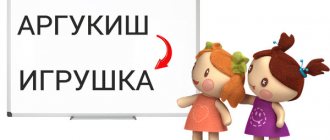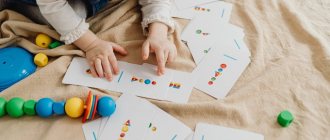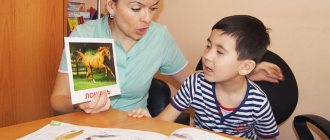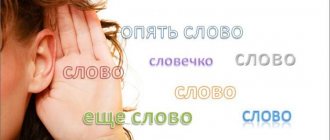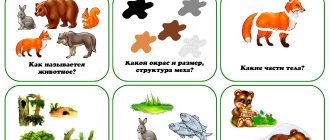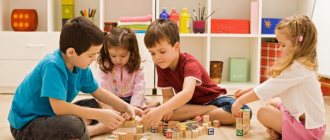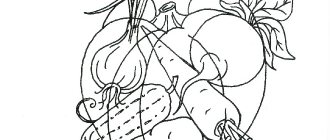Attention, memory and thinking are incredibly important mental processes, and it is better to start developing them at an early age. A good memory helps children quickly absorb knowledge, thinking helps them correctly perceive information and compare facts, attention helps them be selective and be able to concentrate on the most important things.
Development and education of children from 2 to 11 years old in a playful way
Start practicing right now
Start practicing
While developing these processes, many parents, unfortunately, forget about the importance of:
- A complete balanced diet. Diversify your child’s menu by including the necessary vitamins and microelements for proper brain function.
- Sports activities. When a child moves little, his blood is not sufficiently saturated with oxygen, and fatigue appears. This way the baby gets tired faster. If physical activity is contraindicated, just spend more time in the fresh air, taking evening walks with the whole family.
- Have a healthy sleep. Lack of sleep has a bad effect on children's brain activity and memory. Attention becomes distracted, the child becomes uncollected and lethargic.
Remember that first of all you need to create comfortable conditions for children, and only then start learning.
What other points should you consider before starting classes?
- Classes must be regular. Systematic repetition of exercises is the main key to success.
- The duration of the lesson should not exceed 10-15 minutes. Otherwise, such games and exercises will become boring, and the need to repeat them will cause negative emotions.
- Don't force your child to study if he doesn't want to. Turn the lesson into an exciting game, then your baby will always be in a great mood and want to repeat the exercises again and again.
- It is important to gradually increase the difficulty of the training if you want to see progress in children. Slowly add new ones to well-known exercises or complicate your child’s favorite tasks.
There are many different exercises and games to develop children's attention, thinking and memory. We have selected the most interesting and effective ones for you and distributed them by age. Ready to get started?
Games and exercises to develop attention
Exercise “Tangled Lines”
Age: from 3 years
The essence of the exercise is to follow the tangled line from start to finish. You can draw such lines yourself, or you can use ready-made labyrinths. This exercise perfectly develops concentration and perseverance.
Game "Search"
Age: from 3 years
You show your child pictures of objects, among which you need to find a special one that is different from the rest. It may be a different size, shape or color. Gradually complicate the task: ask to find the desired pattern, which stands out only with a small detail. Step by step increase the number of unique items.
Children of all ages love these games. Practice finding differences in our exercise.
In addition to entertainment, object search tasks develop voluntary attention, increase its concentration and increase its volume.
Game "Find the odd one out"
Age: from 4 years
The task is simple - you read a short text to the child, and he claps if he hears inappropriate, “extra” words. For example, three birds were sitting on a branch: a bullfinch, a tit and a monkey. The boy Vitya flew nearby. He heard the birds quack and stopped, their singing sounded so beautiful!
You can come up with your own funny stories or simply replace the words in your child’s favorite fairy tales. The game “Find the odd one out” increases children’s concentration and intelligence, and also improves auditory memory.
Game "Where are the mistakes?"
Age: from 5 years
Prepare in advance a picture in which mistakes were made. For example, in a picture of a winter landscape, draw a beach umbrella, a fan and a hat. The number of errors depends on age: for five-year-olds, 5-6 are enough. For older children there should be more mistakes.
Systematic searches for errors make attention more stable, increasing its concentration.
Game "Numbers"
Age: from 5 years
The adult shows the child a series of numbers that must be remembered in the same order. For example, 1, 2, 3, 5, then 2, 4, 6, 8, 1 and so on. The older the baby, the longer the row can be, but usually it does not exceed 7-8 digits.
The game expands the attention span and develops auditory memory, and also teaches you to analyze and group objects (numbers).
Game "Let's start charging!"
Age: 4-6 years
Let's do some exercises? But not the usual one, but a special “attentive” one! The presenter names the parts of the body and shows them on himself, and the children repeat them. Then the adult begins to confuse the kids, calling one thing and showing another. The child who makes the least mistakes wins.
This fun game develops voluntary attention, auditory memory and motor coordination.
1. Games for identifying common features"How are they similar and how are they different"
The child who received the pebble must guess a riddle, for example, this one: “Two flowers, one with white petals and a yellow center, the other pink, with beautiful fragrant petals, with thorns. One is in the field, the other grows in a flower bed.” After a short pause, the guesser passes the pebble to any of the players. He must answer quickly and make his own riddle. If the guesser is wrong, he pays a forfeit, which is redeemed at the end of the game.
"Find the extra object"
Goal: to develop children’s ability to identify an extra object from a group of objects that are similar in a certain way.
Material: sets of pictures (cow, horse, goat, elk; cornflower, peony, rose, pine; bee, fly, sparrow, bumblebee; dog, cat, parrot, wolf; crucian carp, pike, tench, frog).
Progress of the game: The teacher shows the children several pictures, among which one picture depicts an object that does not belong to the same thematic group as the other objects depicted in the pictures. Children need to point to the “extra” picture and explain why it is extra.
2. Games to identify essential features
"Tops-Roots"
Game rules: You can answer only in two words: tops and roots. Whoever makes a mistake pays a forfeit.
Game action. Playing forfeits.
Progress of the game: The teacher clarifies with the children what they will call roots, and the edible fruit on the stem – tops.” The teacher names a vegetable, and the children quickly answer what is edible in it: the tops or roots. The one who makes a mistake pays a forfeit, which is redeemed at the end of the game.
The teacher may offer another option; he says: “Tops,” and the children remember vegetables whose tops are edible.
"Guess it"
Goal: Describe an object without looking at it, highlight the main features in it; recognize an object by description.
Material: chips.
Progress of the game: at the teacher’s signal, the child who received the chip stands up and gives a description from memory of any object on a given topic (animals, birds, fish, insects, flowers, trees), and then passes the chip to the one who will guess. Having guessed, the child describes his object, passes the chip to the next one, etc. You need to name the essential features of the object: talk only about those objects that are in the room (at the dacha, on the plot).
"Choose what you need"
Goal: to consolidate knowledge about nature; develop the ability to recognize a subject by its essential characteristics.
Material: subject pictures.
Progress of the game: Object pictures are laid out on the table. The teacher names some property or sign, and the children must choose as many objects as possible that have this property.
For example: “green” - these can be pictures of an apple, dill, frog, Christmas tree. Or: “wet” - water, dew, cloud, fog, snow, etc.
3. Games for combining essential features into a class and naming a word
“Hunter” (folk game)
Game rules: You can step into the next cell only after you name the animal. The winner, the good hunter, will be the one who reaches the forest, naming as many animals as there are cells on the way to the forest.
Game actions: Step over the line, name wild animals without repeating. Those who cannot remember come back.
Progress of the game: Somewhere in a free space at one end of the yard or area there is a group of players. This is home. At a distance of several steps from the house - the farther the better - some kind of mark is placed and a line is drawn. This is a forest where different animals live. The hunter, one of the players, goes to this forest. Standing still, he says the following words: “I’m going into the forest to hunt, I’ll hunt for...”. Here he takes a step forward and says: “... like a hare”; takes the second step: “... a bear”; takes the third step: “... like a wolf”; fourth step: “... like a fox”; fifth: “... a badger.” With each step the hunter names an animal. You cannot name the same beast twice. You can't name birds either, but if you play bird hunting, you only need to name birds.
The winner is the one who reaches the forest, naming a new animal with each step. The one who could not do this returns home, and the next one goes hunting. The unsuccessful hunter may be allowed to go hunting again. Perhaps this time the hunt will be successful.
Note. Based on the principle of this game, you can play the game “Fisherman”. The fisherman says: “I’ll go fishing and catch pike, crucian carp, and perch.”
Other games are presented in the Appendix
Perform developmental exercises from Ikyusha
Mathematics
Reading
The world
Logics
English language
Anagrams
Age: from 5-6 years
Anagrams are the rearrangement of letters in a word to form a new word. For example, sleep is nose, rakask is paint. Anagrams work well for children who can already read.
Such tasks increase concentration and speed of thinking, and also develop visual memory.
Schulte tables
Age: from 5 years
Many parents have heard about Schulte tables. These exercises are very popular as they increase concentration and develop memory in a light playful way. The child’s task is simple - to find in order the numbers or letters randomly located in the table. The sizes of the table vary depending on the age and preparation of the baby (usually from 3x3 to 16x16).
Exercise “Listen and count”
Age: 6-8 years
Another great exercise for focusing attention. You read the sentence while tapping your pencil or pen on the table. The child needs to remember both the text and the number of your strokes. If the baby begins to cope easily, complicate the task by gradually increasing the number of blows.
Rules for the development of memory in preschoolers
To achieve the best effect in the development of memory in preschool children, parents need to adhere to some psychological and pedagogical rules. What should parents consider when teaching at home?
- Preschool children remember those objects that have attractiveness and novelty.
- The memory process in a preschooler is selective and depends on his interests and hobbies.
- What is remembered is what is repeated many times.
- Objects that affect the emotional sphere of children are easily and quickly remembered.
- In order to help a child actively develop memory, it is necessary to select the most effective techniques. Experts believe that the best way to train memory is children's games, which occupy a significant place in the lives of preschool children. They will help parents not only engage their preschoolers in interesting leisure activities, but also solve developmental problems. By choosing the right stories, you can play with your child anywhere and at any time. The methodology presents many types of games that can be of great help to parents.
Games and exercises for memory development
Memory Game
Age: from 3 years
This is one of the most famous and favorite memory development games for children. Otherwise it is called “Find a Pair”. The game is a set of paired pictures with the same designs: for the little ones it is usually 12 cards (6 pairs), for older children the number increases. The idea is simple - find identical pairs from the total number of cards lying face down. If the cards match, the player takes them, if not, returns them back.
There are a lot of both paper memories and online games. Ikyusha also loves such exercises, try to find the pairs faster than him?
Game "What's gone?"
Age: from 3 years
An excellent game for developing visual memory and increasing attention span, which does not require additional materials.
Place 4-5 toys or small objects in front of your child for a minute and ask him to turn away. Then remove one item and ask what is missing? The kid must name what is missing. If the game is boring, diversify it by adding a new item.
The task must be gradually made more difficult, increasing both the total number of toys and those that we add or remove. Focus on the child’s age: for example, by the age of 6-7 years, a child can easily remember up to 10 objects.
Choose a pattern
Exercise “Fold the pattern”
Age: from 4 years
Make a pattern or lay out a drawing from simple geometric shapes (can be cut out of cardboard) or construction set parts and ask your child to remember it. Then the child needs to turn away for a while, and during this time you change the location of one figure or part. The baby’s task is to find changes and restore the pattern.
At first you can start with 3-4 parts, gradually increasing their number. If the child can do it easily, remove several parts or all at once, asking him to reassemble the pattern.
This exercise develops memory and imagination, increases the volume and concentration of attention.
Choose a pattern
Game “Remarkables”
Age: from 5 years.
Ask your child to close his eyes and list everything he saw in the room, indoors, outside. The more small details he remembers, the better! Ask your child leading questions if it is still difficult for him to answer. For example, how many children play in the sandbox? Did the cashier at the store have long or short hair? How many cups were there on the table?
Game "Locomotive"
Age: 4-7 years
This is a very fun and entertaining game for a small group of children. The idea is simple - the first child names any object, the next player repeats the word and names his own. The third child repeats what the first two said and adds himself, and so on.
“Locomotive” helps to increase memory capacity, develop auditory perception and voluntary attention. You can also consolidate the material in this way, for example, by naming only fruits, vegetables, trees, flowers.
Memory board games for children over 6 years old
What are the benefits of children's memory games, besides their usefulness? Because adults have no need to play half-heartedly. On the contrary, a child who plays often will give his parents a head start and still win!
Cat-by-the-Tail Tsap! Deluxe (from 6 years old)
Board game Cat-for-Tail Tsap! Deluxe. An original memory training game from the life of Supercats and clever rats. Although each participant only has four cards, it is extremely easy to forget where each one is! But you need to collect cats with minimum values on the cards and under no circumstances welcome rats (they always have large numbers!).
The game has many special cards that help the most forgetful and confuse the most memorable, and even special scanner glasses!
Fabulantika (from 6 years old)
Board game Fabulantika. Help fairy-tale characters find each other. In front of you is a large field, where under each of the yellow caps one of the heroes of fairy tales is hidden: Puss in Boots, Genie, Little Mook and many others. Move your pieces to find the heroes indicated on the task card. Help them visit each other.
In addition to the obvious memory training of where which hero is hiding, children will have to calculate how to achieve the desired goal, because movement on the map occurs with the help of path cards, and not by throwing a dice. This is not difficult for adults, but for children it can be difficult to notice an unobvious path for which there are enough necessary cards.
Alles Tomate (from 6 years old)
The board game Alles Tomate is a fast and fun memory game with a farming theme.
Players must remember the items on the upside-down cards, and when a card of the same theme appears from the deck, be the first to shout out the name of the item on the face-down card. And it seems like remembering 7 cards is not a difficult task. But to do it quickly, and even when new cards are constantly opening up... You need good training!
Cheese castle (from 6 years old)
Board game Cheese Castle. Every mouse wants to know where the cheese is! Players control a squad of mice of their own color. The little mice quickly try to get under the roof of the Cheese Castle in order to get four different varieties of cheese.
A good memory will be very useful: after all, the rooms that are under the roof can be seen only for a moment. You need to be very careful, the situation on the playing field changes often, and at any second there may be a trap hole under your paws through which the mouse will fall straight into the dungeon.
Cheese Castle is a board game for children, which ranks 5th in the ranking of the best children's games in the world!
Knowledge Chests
Board game Chests of Knowledge. A unique series of useful games for children. Excellent visual memory training and a lot of educational information. You can play Chests of Knowledge either alone or in a large group. The rules of the game are very simple: we take a card, turn over the hourglass, read and remember the information, roll the dice, and, having thus determined the question number, answer it. The answer is correct - we keep the card, if not - we return it to the chest, and pass the turn to the next participant.
With Chests you can learn the ABCs, join the World of Mathematics, learn many interesting facts about Great Inventions and Nature, and travel Around the World! And these are not all topics 
Island Escape (from 8 years old)
Board game Escape from the Island. An unusual cooperative game against the clock! Players have only 2 minutes to find all the inhabitants of the island and save them from a volcanic eruption. Based on the mechanics of “memory” (a game of remembering the location of paired cards), it is very different from its peers in the genre: both in that it is cooperative, and in the time limit, and in the presence of a plot
Game 2. Tag
Tag is a great way to exercise your brain! The game of tag is a square board divided into 16 equal square sections. You have 15 square dominoes at your disposal, numbered accordingly. The dominoes themselves are randomly mixed inside the box.
The essence of this game is to put the dominoes in order, namely to place the numbers one after another from top to bottom, from left to right, therefore, the empty square should be from the bottom to the right. The game will help you develop logical thinking and memory, because it is useful to remember various tricks and combinations. You will also be able to develop the ability to calculate moves ahead without making mistakes. Shall we play?
Game 8. Letter span
The game “Letter Span” develops memory and attention. The main point of the game is to remember the letters and write them correctly. In this game, there is a black scoreboard on the screen; on this scoreboard, different letters are displayed for a few seconds, you need to remember these letters and when the letters disappear, write them on the black scoreboard.
The letters are located at the bottom of the screen, use the mouse to click on the desired letters, and they will appear on the black board. The game starts with a smaller number of letters, first two letters appear on the screen, then three letters, then four and so on. If you answered correctly, then you continue to score points and play further.
Play now
Game 12. 3 ago
The game “Number 3 Backwards” develops memory. The main essence of the game is to remember the sequence of numbers and compare the number on the last card with the previous card. In this game, cards with numbers are given on the screen, the numbers on the cards are revealed for a few seconds, then disappear and other numbers appear.
You need to remember the entire sequence of numbers that was shown on the screen and compare the number of the last card with the previous card. Read the question on the screen carefully. At the bottom of the screen there are two buttons “yes” and “no”. Using the mouse, you can press the button you need. If you answered correctly, then you continue to score points and play further.
Play now
